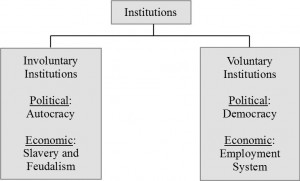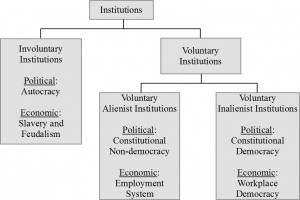Part I of a Five Part Review of
John Tomasi’s Free Market Fairness
The fundamental consent-versus-coercion misframing
John Tomasi’s new book, Free Market Fairness [2012], has been well-received as “one of the very best philosophical treatments of libertarian thought, ever” (Tyler Cowen) and as a “long and friendly conversation between Friedrich Hayek and John Rawls—a conversation which, astonishingly, reaches agreement” (Deirdre McCloskey). The book has also been the focus of a symposium of liberal thinkers on the Bleeding Heart Libertarians blog.
The book does present an authoritative state-of-the-debate across the spectrum from right-libertarianism and classical liberalism on the one side, and high liberalism (that shares some shades of opinion with democratic socialism) on the other side. My point is not to question where Tomasi comes down with his own version of “market democracy” as a remix of Hayek and Rawls. My point is to use his sympathetic restatements of views across the liberal spectrum to show the basic misframings and common misunderstandings that cut across the liberal viewpoints surveyed in the book.
The first and most basic misframing is the one that practically defines liberalism of all stripes, namely the framing of issues in terms of consent versus coercion, and then the taking of a high moral stand in favor of consent and contract as opposed to systems based on inherited status, divine rights, patriarchy, or totalitarian coercion. “Legitimate government must be founded on the consent of the governed.” [p. 5]
But this is a rather selective liberal view of intellectual history that ignores the fact that from Antiquity down to the present, the sophisticated defenses of political autocracy and even individual slavery have been based on consent.
For instance, the codification of Roman law in Institutes of Justinian gave three ways slavery could be legitimate and all had the incidence of consent and contract. One was an explicit contract. Another was a case where a person had by their own actions committed a crime worthy of capital punishment (e.g., being a prisoner in a war against Rome) and who then voluntarily agreed in a plea bargain to a lifetime of slavery instead of the capital punishment. And the third rationale is where a child of a slave mother is raised for eighteen or so years using the food, clothing, and shelter provided by the master, and this debt needs to be paid off through work (all the while accumulating more debt to the “company store”) or some other payment that would be a buy-out or manumission from this debt peonage. (For those who have been spared exposure to this dark side in the history of liberal thought, quotations supporting the voluntary slavery contract from Antiquity through John Locke and down to Robert Nozick are gathered together on the Abolish Human Rentals Facebook page.)
On the liberal idea of government based on the “consent of the governed,” the great legal scholar, Otto von Gierke showed that at least by the Middle Ages, “there was developed a doctrine which taught that the State had a rightful beginning in a Contract of Subjection to which the People was party…. Indeed that the legal title to all Rulership lies in the voluntary and contractual submission of the Ruled could therefore be propounded as a philosophic axiom.” [Gierke 1958, pp. 38-40] For instance, where monarchy existed as a settled condition, then the sophisticated legitimation was not by Locke’s carefully chosen foil, the patriarchy of Filmer, or by the Church’s divine right, but by the implied contract of subjection that had been vouchsafed by the prescription of time.
Since the sophisticated defense of all stripes of autocracy could be viewed as based on a social contract of subjection, the pactum subjectionis, what then is the defining characteristic of democracy that seems to escape our classical liberal scholars? The relevant distinction is not the contrast of coercion versus consent (or status versus contract etc.), but the distinction between (1) contracts that alienate and transfer the right of self-government and (2) contracts that only delegate authority to representatives to govern in the name of the governed. Again Gierke explains.
This dispute also reaches far back into the Middle Ages. It first took a strictly juristic form in the dispute … as to the legal nature of the ancient “translatio imperii” from the Roman people to the Princeps. One school explained this as a definitive and irrevocable alienation of power, the other as a mere concession of its use and exercise. … On the one hand from the people’s abdication the most absolute sovereignty of the prince might be deduced, … . On the other hand the assumption of a mere “concessio imperii” led to the doctrine of popular sovereignty. [Gierke 1966, 93-94]
The civic republican scholar, Quentin Skinner, has emphasized the same contrast between alienation and delegation [1978]. Democratic theory is in fact based not on the courageous liberal stand against coercion and in favor of the consent of the governed, but on a critique of the contracts of alienation as alienating that which is inalienable (see blogs on inalienable rights theory).
But the critique of contracts of alienating self-governance is not “available” to Tomasi or other liberal thinkers who keep returning to the simple coercion-versus-consent framing of the question.
Fundamentally, there are only two ways of co-ordinating the economic activities of millions. One is central direction involving the use of coercion—the technique of the army and of the modern totalitarian state. The other is voluntary co-operation of individuals—the technique of the market place. [Friedman 1962, 13]
Fortunately, there is a deeper tradition that descends from the Reformation and Enlightenment and that is based on inalienable rights arguments against the alienation contracts per se (not against their abuses). Alienation contracts such as the self-sale contract, the nondemocratic constitution, and the coverture marriage contract have all been outlawed in the western democracies–although there are liberal attempts to revive consent-based nondemocratic government in the idea of charter cities, “free cities,” and seasteading (see my blog on charter cities and democratic theory).
This inalienable rights critique of personal alienation contracts is not a choice in the liberal buffet because the contractual foundation for the governance of what most people do all day long, namely the employment contract, is an alienation contract. The employer is not the delegate, representative, or trustee of the employees and does not manage in the name of those managed. Hence the liberal insistence on the consent-versus-coercion framing is required so that the “legal relationship normally called that of ‘master and servant’ or ‘employer and employee’” [Coase 1937, 403] and political democracy will appear on the same side of framing dichotomy (whereas they would be on the opposite sides of an alienation-versus-delegation dichotomy). That is why the alienation-vs.-delegation framing is available to thinkers of (say) civic republican bent (like Skinner or Gierke) but is unavailable to libertarian or liberal thinkers who seem to be tasked with giving an “account” of the current economic system based on the voluntary renting of human beings. [1]
Tomasi continually repeats the standard clichés about consent versus coercion, and seems to have no inkling that this might be a superficial misframing of the real questions.[2] And there is little reason for Tomasi or other libertarians and classical liberals to reframe the debate since they are ably assisted in maintaining the consent-vs.-coercion misframing by the wide swath of leftists who play the fruitful social role of accepting and thus ‘validating’ the misframing, and then simply arguing the opposite side of the dichotomy that the employment contract is “really” coercive.[3]
References
Coase, R. H. 1937. The Nature of the Firm. Economica. IV (Nov. 1937): 386-405.
Ellerman, David 1992. Property & Contract in Economics: The Case for Economic Democracy. Cambridge MA: Blackwell. All my references downloadable at: www.ellerman.org .
Ellerman, David 2005. Translatio versus Concessio: Retrieving the Debate about Contracts of Alienation with an Application to Today’s Employment Contract. Politics & Society. 33: 449-80.
Ellerman, David 2010a. Marxism as a Capitalist Tool. Journal of Socio-Economics. 39 (6 December): 696-700.
Ellerman, David 2010b. Inalienable Rights: A Litmus Test for Liberal Theories of Justice. Law and Philosophy. 29 (5 September): 571-599.
Friedman, Milton 1962. Capitalism and Freedom. Chicago: University of Chicago Press.
Gierke, Otto von 1958. Political Theories of the Middle Age. Trans. F. W. Maitland, Boston: Beacon Press.
Gierke, Otto von 1966. The Development of Political Theory. Trans. B. Freyd, New York: Howard Fertig.
Skinner, Quentin 1978. The foundations of modern political thought. Volume Two: The Age of Reformation. Cambridge: Cambridge University Press.
Tomasi, John 2012. Free Market Fairness. Princeton: Princeton University Press.

